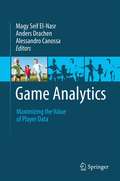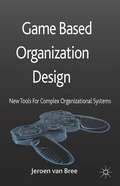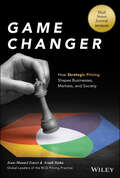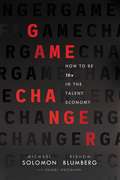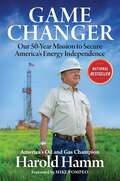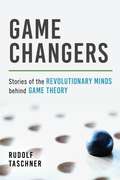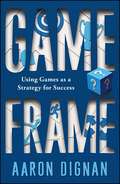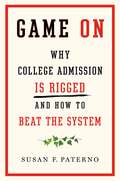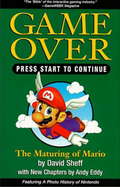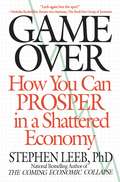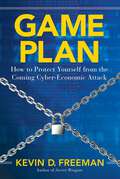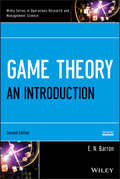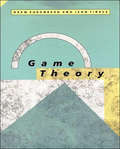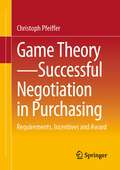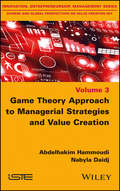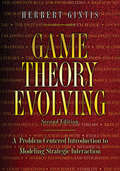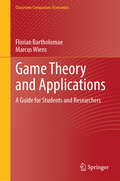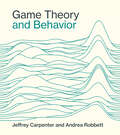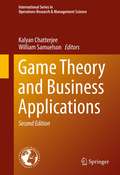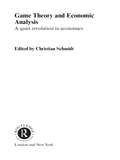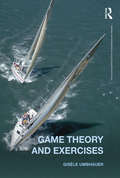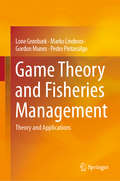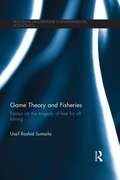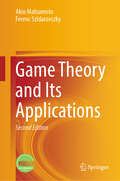- Table View
- List View
Game Analytics
by Alessandro Canossa Magy Seif El-Nasr Anders DrachenDeveloping a successful game in today's market is a challenging endeavor. Thousands of titles are published yearly, all competing for players' time and attention. Game analytics has emerged in the past few years as one of the main resources for ensuring game quality, maximizing success, understanding player behavior and enhancing the quality of the player experience. It has led to a paradigm shift in the development and design strategies of digital games, bringing data-driven intelligence practices into the fray for informing decision making at operational, tactical and strategic levels. Game Analytics - Maximizing the Value of Player Data is the first book on the topic of game analytics; the process of discovering and communicating patterns in data towards evaluating and driving action, improving performance and solving problems in game development and game research. Written by over 50 international experts from industry and research, it covers a comprehensive range of topics across more than 30 chapters, providing an in-depth discussion of game analytics and its practical applications. Topics covered include monetization strategies, design of telemetry systems, analytics for iterative production, game data mining and big data in game development, spatial analytics, visualization and reporting of analysis, player behavior analysis, quantitative user testing and game user research. This state-of-the-art volume is an essential source of reference for game developers and researchers. Key takeaways include: Thorough introduction to game analytics; covering analytics applied to data on players, processes and performance throughout the game lifecycle.In-depth coverage and advice on setting up analytics systems and developing good practices for integrating analytics in game-development and -management.Contributions by leading researchers and experienced professionals from the industry, including Ubisoft, Sony, EA, Bioware, Square Enix, THQ, Volition, and PlayableGames. Interviews with experienced industry professionals on how they use analytics to create hit games.
Game Based Organization Design
by Jeroen Van BreeThere is a widening gap between the current organizational reality and the tools and methods available to managers for addressing its challenges. Game Based Organization Design shows that one of the ways to bridge this gap is to introduce insights and approaches from video game design into the design of organizational systems.
Game Changer: How Strategic Pricing Shapes Businesses, Markets, and Society
by Jean-Manuel Izaret Arnab SinhaThe right pricing strategy can change the entire trajectory of a business, a market, and even society at large. To help you create your best pricing strategy efficiently and confidently, two leaders from BCG are introducing fresh perspectives on pricing that take you far beyond the realm of mind-numbing numbers.In their new book Game Changer: How Strategic Pricing Shapes Businesses, Markets, and Society, Jean-Manuel Izaret and Arnab Sinha simplify and clarify pricing strategy by integrating its many frameworks and concepts into seven distinct pricing games, each with its own proven tools, rules, forces, and structures. To help you pick the right game and play it well, Izaret and Sinha have developed the Strategic Pricing Hexagon, a tool refined through years of testing, iteration, and adaptation. The Hexagon is your portal to a business world where stronger growth and better financial performance come from a set of strategic pricing decisions, not endless myopic quests for optimal prices.But more than that, the Hexagon will change the way you think about and talk about pricing. The current conversation around pricing – as expressed through economics textbooks, Excel spreadsheets, political discourse, and educated guesswork – makes it easy to believe that pricing is nothing more than a technical, tactical and, for most people, boring game of numbers. Game Changer changes that conversation bysharing stories and research that bring the Hexagon and its seven pricing games to life.With research from BCG’s Bruce Henderson Institute and real-world examples from the world's most influential companies, the authors and their colleagues at BCG define pricing strategy as a business leader’s or business owner’s conscious decisions about how money flows in their market. They show how companies succeed in the long term when they focus on collaborative growth and value sharing with customers, not zero-sum value extraction from them.Discover how you can create and implement a winning pricing strategy that changes the trajectory of your business, your market, and even society.
Game Changer: How to Be 10x in the Talent Economy
by Michael Solomon Rishon BlumbergWhether you&’re an employer, an employee, a freelancer, or part of a management team, it&’s important to understand how—now, more than ever—highly skilled 10x talent who can deliver exponential value is radically shifting the dynamics of corporations large and small. Use this groundbreaking book to learn how to identify, attract, vet, employ, manage, and retain—or become—the game-changing talent that will make a difference in the work world of tomorrow.Individuals, companies and governments around the globe need to understand what tactics are required to survive and thrive in an increasingly global, automated, and post pandemic, distributed economy. The lessons presented in Game Changer reveal those tactics for any industry.Learn proven strategies on how companies can create the right environment for top talent by evolving traditional business structures and adopting a more agile approach. For readers who are confident in their abilities and want to make an impact where they work, Game Changer shows them how to enjoy the varied rewards that this brings.In these pages, you will:See how highly skilled talent is transforming companies of all sizes and industries through real world stories and first-hand testimonies from top execs, entrepreneurs, and players;Get an inside glimpse into the unconventional methods that smart companies use to attract, retain, and manage top talent;Recognize the roadblocks that are inherent in the traditional employer-employee model and learn how they can be overcome for unlimited success; andLearn how to see yourself as both talent and management to achieve the rewards and satisfaction that come with being a game changer.
Game Changer: Our Fifty-Year Mission to Secure America's Energy Independence
by Harold HammGame Changer is the story of one man&’s fifty-year journey doing battle with the conventional wisdom and in the process helping to restore America as an energy superpower. A day doesn&’t go by without energy in the headlines. From banning gas stoves to prices at the pump to threats to the world&’s energy supplies, energy is front and center. Most of what we are hearing is high emotion, low-fact misinformation offered by folks who have no clue what they are talking about. Game Changer is the story of Harold Hamm and his fifty-year journey battling conventional wisdom and, in the process, helping restore America as an energy superpower. How did he do it? With horizontal drilling. What Hamm did was game changing—for his country and the world. In Game Changer, Hamm explains: Why American Energy Independence is the most important policy to guarantee our long-term economic and national security. How the conversion to natural gas for electricity production in the US has led to the largest declines in emissions in the industrialized world. Why much of the energy narrative is distorted by money, politics, activism, and virtue-signaling. Why the so-called &“energy crisis&” in America is self-inflicted. We&’ve been relentlessly told that oil and natural gas is the enemy, that humanity&’s very existence depends on its extinction. Yet our whole world—your world—runs on it. Game Changer invites you to learn the real story, the story we all need to hear, told through the common-sense eyes of the man who has led what he calls the American Energy Renaissance. If you care about your future, and the future of your kids and grandkids, read this book.
Game Changers: Stories of the Revolutionary Minds behind Game Theory
by Rudolf TaschnerIn this lively history of game theory, a gifted math educator and science writer explains for lay readers the uses and value of this innovative yet easy-to-understand approach to mathematical modeling. Essentially, game theory interprets life as a game with mathematical rules. By following the rules, decisions can be calculated that result in the greatest benefit for all participants.The author takes the reader from the 17th century through the Cold War to today's age of turbo capitalism. Along the way he introduces such leading contributors as Blaise Pascal in the 17th century, who invented the theory of probability; Ludwig Wittgenstein in the 20th century, who conceived of the world as a play of words; John Nash (the subject of A Beautiful Mind) in the 1950s, who laid the foundation of modern game theory; and today's practitioners who apply the theory to global finance and military strategy.As the author shows, game theory is more than a type of cost-benefit analysis; ultimately, it is a quest for meaning.
Game Frame
by Aaron DignanEver wonder why teens can spend entire weekends playing video games but struggle with just one hour of homework? Why we're addicted to certain websites and steal glances at our smartphones under the dinner table? Or why some people are able to find joy in difficult or repetitive jobs while others burn out? It's not the experiences themselves but the way they're structured that matters. All our lives we've been told that games are distractions--playful pastimes, but unrelated to success. In Game Frame, Aaron Dignan shows us that the opposite is true: games produce peak learning conditions and accelerated achievement. Here, the crucial connection between the games we love to play and the everyday tasks, goals, and dreams we have trouble realizing is illuminated. Aaron Dignan is the thirty-something founder of a successful digital strategy firm that studies the transformative power of technology in culture. He and his peers were raised on a steady diet of games and gadgets, ultimately priming them to challenge the status quo of the modern workplace. What they learned from games goes deeper than hand-eye coordination; instead, this generation intrinsically understands the value of adding the elements of games into everyday life. Game Frame is the first prescriptive explanation of what games mean to us, the human psychology behind their magnetic pull, and how we can use the lessons they teach as a framework to achieve our potential in business and beyond. Games are a powerful way to influence and change behavior in any setting. Here, Dignan outlines why games and play are such important trends in culture today, and how our technology, from our iPhones to our hybrid cars, primes us to be instinctive players. Game Frame tackles the challenging task of defining games and the mechanics that make games work from several perspectives, then explores these ideas through the lens of neuroscience. Finally, Dignan provides practical tips for using basic game mechanics in a variety of settings, such as motivating employees at work or encouraging children at home, giving readers the tools to develop their own games to solve problems in their everyday lives. Illuminated throughout with a series of real-world examples and hypothetical scenarios, Game Frame promises a crash course in game design and behavioral psychology that will leave the reader--and, by extension, the world itself--more productive. Revolutionary, visionary, practical, and time-tested, Game Frame will change the way you approach life.
Game On: Why College Admission Is Rigged and How to Beat the System
by Susan F. PaternoDirector of the Chapman journalism program—and mother of four recent college grads—Susan F. Paterno leads you through the admissions process to help you and your family make the best decision possible.How is it possible that Harvard is more affordable for most American families than their local state university? Or that up to half of eligible students receive no financial aid? Or that public universities are rejecting homegrown middle- and working-class applicants and instead enrolling wealthy out-of- state students? College admission has escalated into a high-stakes game of emotional and financial survival. How is the deck stacked against you? And what can you do about it?Susan F. Paterno, a veteran academic and journalist, answers these questions and more in Game On. Paterno helped her four very different kids navigate the application process to a wide range of colleges, paying for their four-year educations on a finite budget. She incisively decodes the college admission industry—the consultants, the tutors, the rankers, the branding companies hawking “advantage”—and arms you with the knowledge you need to make the system work for you.You’ll learn how to narrow your focus, analyze who gets in and why, and look for the right financial fit before considering anything else, including geography, reputation, and, especially, ranking.Among the tools and insights in Game On:· Why forty years of failed free-market policies have led to skyrocketing tuition and historic levels of student debt· Why applying to college has become a bewildering maze and how to find your way to a successful result· Why college costs are more terrifying than you think· How to read beyond the rack rate to negotiate the best financial package with the least debt· Why merit is a myth, but merit aid is essential· The difference between family debt and student debt and how to split itA playbook for the Hunger Games of higher education, Game On explains the anxiety, uncertainty, and chaos in college admission, explodes the myth of meritocracy, exposes the academy’s connection to America’s widening gap between rich and poor, and provides strategies to beat—and reform—a broken system.
Game Over: How Nintendo Conquered the World
by David SheffMore American children recognize Super Mario, the hero of one of Nintendo's video games, than Mickey Mouse. The Japanese company has come to earn more money than the big three computer giants or all Hollywood movie studios combined. Now Sheff tells of the Nintendo invasion--a tale of innovation and cutthroat tactics.
Game Over: How You Can Prosper in a Shattered Economy
by Donna Leeb Glen Strathy William Leeb Genia Turanova Stephen LeebIn these extraordinarily uncertain economic times, bestselling author Dr. Stephen Leeb has very carefully analyzed some of the basic and fundamental flaws of our economy, and his arguments are both compelling and frightening. Yes, we already know that we are in desperate need of finding alternative sources of energy, but what Leeb details is just how close we really are to running out of oil, and that popular alternative plans such as wind power, solar power, ethanol, nuclear energy, and so on just aren't going to serve as the immediate answers. Leeb makes it abundantly clear that the clock is ticking....and it's time to wake up. When Stephen Leeb wrote the national bestseller THE COMING ECONOMIC COLLAPSE a few years ago, he predicted that the price of oil would quickly soar past $100 a barrel and push the price of gas at the pump to $4.00 a gallon. At the time of that book's publication, gas cost $2.50 and oil was around $65 a barrel. Now - in the most dramatic and most important book that Leeb has written to date - he shows how the combination of several key factors - including inflation, the every weakening dollar, the soaring price of oil, increasing competition from China and India, and our runaway national debt - are going to make for a very rocky road for Americans in the next few years. The good news is that Leeb provides some key and valuable information as to how smart investors can survive. Is gold still the answer? What stocks will actually thrive in a down market? What happens to the real estate market? What professions will be the best ones to choose? All of these issues, and much more, are covered by Leeb in GAME OVER. It's startling but mandatory reading.
Game Plan: How to Protect Yourself from the Coming Cyber-Economic Attack
by Kevin D. FreemanGame Plan is the first "how to" investment handbook of its type. It will explain the emerging risks and provide a complete game plan of response for investors at all levels. Freeman will explain that there is no "one size fits all" solution as events are happening quickly and the challenges can morph suddenly. Just as a football team must plan for a variety of offensive strategies and attacks, investors must be prepared to strategically adjust. This book provides the game plan to respond and succeed.In Game Plan you'll learn...The proper use of gold in your investment strategyHow stocks should be deployed in your investment portfolioThe smart way to diversify your portfolioHow to decrease your bond holding vulnerabilityHow to judge a guarantor in guaranteed investmentsHow to avoid falling into the marketing hype for Hedge Fund scamsHow to find a properly trained investment advisorHow to advance wealth at the individual levelHow to win the global economic war
Game Theory
by E. N. BarronAn exciting new edition of the popular introduction to game theory and its applicationsThe thoroughly expanded Second Edition presents a unique, hands-on approach to game theory. While most books on the subject are too abstract or too basic for mathematicians, Game Theory: An Introduction, Second Edition offers a blend of theory and applications, allowing readers to use theory and software to create and analyze real-world decision-making models.With a rigorous, yet accessible, treatment of mathematics, the book focuses on results that can be used to determine optimal game strategies. Game Theory: An Introduction, Second Edition demonstrates how to use modern software, such as MapleTM, Mathematica®, and Gambit, to create, analyze, and implement effective decision-making models. Coverage includes the main aspects of game theory including the fundamentals of two-person zero-sum games, cooperative games, and population games as well as a large number of examples from various fields, such as economics, transportation, warfare, asset distribution, political science, and biology. The Second Edition features:* A new chapter on extensive games, which greatly expands the implementation of available models* New sections on correlated equilibria and exact formulas for three-player cooperative games* Many updated topics including threats in bargaining games and evolutionary stable strategies* Solutions and methods used to solve all odd-numbered problems* A companion website containing the related Maple and Mathematica data sets and codeA trusted and proven guide for students of mathematics and economics, Game Theory: An Introduction, Second Edition is also an excellent resource for researchers and practitioners in economics, finance, engineering, operations research, statistics, and computer science.
Game Theory (The\mit Press Ser. #Vol. 2)
by Jean Tirole Drew FudenbergThis advanced text introduces the principles of noncooperative game theory in a direct and uncomplicated style that will acquaint students with the broad spectrum of the field while highlighting and explaining what they need to know at any given point.This advanced text introduces the principles of noncooperative game theory—including strategic form games, Nash equilibria, subgame perfection, repeated games, and games of incomplete information—in a direct and uncomplicated style that will acquaint students with the broad spectrum of the field while highlighting and explaining what they need to know at any given point. The analytic material is accompanied by many applications, examples, and exercises. The theory of noncooperative games studies the behavior of agents in any situation where each agent's optimal choice may depend on a forecast of the opponents' choices. "Noncooperative" refers to choices that are based on the participant's perceived selfinterest. Although game theory has been applied to many fields, Fudenberg and Tirole focus on the kinds of game theory that have been most useful in the study of economic problems. They also include some applications to political science. The fourteen chapters are grouped in parts that cover static games of complete information, dynamic games of complete information, static games of incomplete information, dynamic games of incomplete information, and advanced topics.
Game Theory - Successful Negotiation in Purchasing: Requirements, Incentives and Award
by Christoph PfeifferApplied game theory in purchasing has become an important tool in many companies for systematically achieving success in negotiations. The central building block of game-theoretically optimized awards are purchasing auctions. A basic knowledge of auctions and game theory is therefore particularly important for purchasers.This book describes very clearly many helpful methods as well as their application in practice. Procurement situations which have a high volume, which are interesting for suppliers and whose performance can be well specified are particularly suitable for the use of game theory in purchasing. It also shows how cartels or restrained competition between suppliers can be identified using a purely data-based method.Every purchase involves a sale. The book is therefore not only aimed at buyers. Auctions in procurement and the underlying game-theoretical principles also play an equally significant role for sellers.Applied game theory in purchasing has become an important tool in many companies for systematically achieving success in negotiations. The central building block of game-theoretically optimized awards are purchasing auctions. A basic knowledge of auctions and game theory is therefore particularly important for purchasers.This book describes very clearly many helpful methods as well as their application in practice. Procurement situations which have a high volume, which are interesting for suppliers and whose performance can be well specified are particularly suitable for the use of game theory in purchasing. It also shows how cartels or restrained competition between suppliers can be identified using a purely data-based method.Every purchase involves a sale. The book is therefore not only aimed at buyers. Auctions in procurement and the underlying game-theoretic principles also play an equally significant role for sellers.
Game Theory Approach to Managerial Strategies and Value Creation
by Abdelhakim Hammoudi Nabyla DaidjEconomic players must often choose between several strategic options in a fierce competitive environment where interactions with competitors make decisions particularly complex. Game theory offers useful insights to choose an optimal decision or at least a basis for making rational decision given the constraints of the stakeholders’ environment. In presenting the concepts and the logical structure of the reasoning offered by game theory and their applications, the book explains the rational process of decision making in the framework of firm management and market competition. By avoiding the usual complexity of presentation often due to mathematical formalism, the book proposes a reflection and practical insights of game theory for practitioners (managers, strategists) and social, managerial and economic researchers. The book will expose both general teachings and a comprehensive analysis applied to specific case studies of various sectors of the economy.
Game Theory Evolving: A Problem-Centered Introduction to Modeling Strategic Interaction - Second Edition
by Herbert GintisSince its original publication in 2000, Game Theory Evolving has been considered the best textbook on evolutionary game theory. This completely revised and updated second edition of Game Theory Evolving contains new material and shows students how to apply game theory to model human behavior in ways that reflect the special nature of sociality and individuality. The textbook continues its in-depth look at cooperation in teams, agent-based simulations, experimental economics, the evolution and diffusion of preferences, and the connection between biology and economics. Recognizing that students learn by doing, the textbook introduces principles through practice. Herbert Gintis exposes students to the techniques and applications of game theory through a wealth of sophisticated and surprisingly fun-to-solve problems involving human and animal behavior. The second edition includes solutions to the problems presented and information related to agent-based modeling. In addition, the textbook incorporates instruction in using mathematical software to solve complex problems. Game Theory Evolving is perfect for graduate and upper-level undergraduate economics students, and is a terrific introduction for ambitious do-it-yourselfers throughout the behavioral sciences. Revised and updated edition relevant for courses across disciplines Perfect for graduate and upper-level undergraduate economics courses Solutions to problems presented throughout Incorporates instruction in using computational software for complex problem solving Includes in-depth discussions of agent-based modeling
Game Theory and Applications: A Guide for Students and Researchers (Classroom Companion: Economics)
by Florian Bartholomae Marcus WiensThis textbook provides an overview of the fundamentals of game theory and its applications in various fields. It introduces game theory as an established toolkit for the mathematical analysis and evaluation of strategic decisions. Through applied exercises, it introduces the basic concepts of game theory and offers students from various disciplines the opportunity to practice the concepts through in-depth training. The textbook addresses advanced students of economics, business administration, and related disciplines, university graduates with basic mathematical training as well as interested readers from all fields. For this, it provides student-friendly explanations, a variety of exercises and problems, and useful references to further reading. The book is divided into a beginner-friendly theory section, in which the most important aspects are presented in a compact and clear manner, and an application-oriented problem section, in which the readers can directly check what they have learned and find many application examples. The latter can also be used as a source of inspiration for instructors.
Game Theory and Behavior
by Jeffrey Carpenter Andrea RobbettAn introduction to game theory that offers not only theoretical tools but also the intuition and behavioral insights to apply these tools to real-world situations.This introductory text on game theory provides students with both the theoretical tools to analyze situations through the logic of game theory and the intuition and behavioral insights to apply these tools to real-world situations. It is unique among game theory texts in offering a clear, formal introduction to standard game theory while incorporating evidence from experimental data and introducing recent behavioral models. Students will not only learn about incentives, how to represent situations as games, and what agents &“should&” do in these situations, but they will also be presented with evidence that either confirms the theoretical assumptions or suggests a way in which the theory might be updated.Features:Each chapter begins with a motivating example that can be run as an experiment and ends with a discussion of the behavior in the example.Parts I–IV cover the fundamental &“nuts and bolts&” of any introductory game theory course, including the theory of games, simple games with simultaneous decision making by players, sequential move games, and incomplete information in simultaneous and sequential move games.Parts V–VII apply the tools developed in previous sections to bargaining, cooperative game theory, market design, social dilemmas, and social choice and voting.Part VIII offers a more in-depth discussion of behavioral game theory models including evolutionary and psychological game theory.Supplemental material on the book&’s website include solutions to end-of-chapter exercises, a manual for running each chapter&’s experimental games using pencil and paper, and the oTree codes for running the games online.
Game Theory and Business Applications
by Kalyan Chatterjee William SamuelsonGame theory has been applied to a growing list of practical problems, from antitrust analysis to monetary policy; from the design of auction institutions to the structuring of incentives within firms; from patent races to dispute resolution. The purpose of Game Theory and Business Applications is to show how game theory can be used to model and analyze business decisions. The contents of this revised edition contain a wide variety of business functions - from accounting to operations, from marketing to strategy to organizational design. In addition, specific application areas include market competition, law and economics, bargaining and dispute resolution, and competitive bidding. All of these applications involve competitive decision settings, specifically situations where a number of economic agents in pursuit of their own self-interests and in accordance with the institutional "rules of the game" take actions that together affect all of their fortunes. As this volume demonstrates, game theory provides a compelling guide for analyzing business decisions and strategies.
Game Theory and Business Strategy
by Felix Oberholzer-Gee Dennis YaoProvides a brief introduction to the application of game theory to business settings. Sets up and analyzes a minicase involving commitment.
Game Theory and Economic Analysis: A Quiet Revolution in Economics (Routledge Advances In Game Theory Ser.)
by Christian SchmidtThis book presents the huge variety of current contributions of game theory to economics. The impressive contributions fall broadly into two categories. Some lay out in a jargon free manner a particular branch of the theory, the evolution of one of its concepts, or a problem, that runs through its development. Others are original pieces of work tha
Game Theory and Exercises (Routledge Advanced Texts in Economics and Finance)
by Gisèle UmbhauerGame Theory and Exercises introduces the main concepts of game theory, along with interactive exercises to aid readers’ learning and understanding. Game theory is used to help players understand decision-making, risk-taking and strategy and the impact that the choices they make have on other players; and how the choices of those players, in turn, influence their own behaviour. So, it is not surprising that game theory is used in politics, economics, law and management. This book covers classic topics of game theory including dominance, Nash equilibrium, backward induction, repeated games, perturbed strategie s, beliefs, perfect equilibrium, Perfect Bayesian equilibrium and replicator dynamics. It also covers recent topics in game theory such as level-k reasoning, best reply matching, regret minimization and quantal responses. This textbook provides many economic applications, namely on auctions and negotiations. It studies original games that are not usually found in other textbooks, including Nim games and traveller’s dilemma. The many exercises and the inserts for students throughout the chapters aid the reader’s understanding of the concepts. With more than 20 years’ teaching experience, Umbhauer’s expertise and classroom experience helps students understand what game theory is and how it can be applied to real life examples. This textbook is suitable for both undergraduate and postgraduate students who study game theory, behavioural economics and microeconomics.
Game Theory and Fisheries Management: Theory and Applications
by Lone Grønbæk Marko Lindroos Gordon Munro Pedro PintassilgoThis book is the first to present in a systematic manner the application of game theory to fisheries management at both international and national levels. Strategic interaction among fishers and nations exploiting fishery resources is an inescapable fact of life. This has long been recognized at the international level, and is becoming increasingly recognized at the national/regional level. It follows, therefore, that, in order to be able to analyse effectively the management of these resources, the theory of strategic interaction ̶ game theory ̶ must be brought to bear. In this book the step-by-step development of the game theory is accompanied by numerous applications to the real world of fisheries management policy. As such, it is designed to appeal to policy makers and stakeholders, as well as to graduate students in Economics.
Game Theory and Fisheries: Essays on the Tragedy of Free for All Fishing (Routledge Explorations in Environmental Economics #41)
by Ussif Rashid SumailaToday, there is a growing sense of urgency among fisheries scientists regarding the management of fish stocks, particularly among those who predict the imminent collapse of the fishing industry due to stock depletion. This book takes a game theoretic approach to discussing potential solutions to the problem of fish stock depletion. Acknowledging the classification of fish stocks as destructible renewable resources, these essays are concerned with the question of how much of the stock should be consumed today and how much should be left in place for the future. The book targets both economists and students of economics who are familiar with the tools of their trade but not necessarily familiar with game theory in the context of fisheries management. Importantly, the goal is not to give a summary evaluation of the current views of the ‘appropriate’ response to immediate policy questions, but rather to describe the ways in which the problems at hand can be productively formulated and approached using game theory and couched on real world fisheries. Game Theory and Fisheries consists of twelve previously published but updated articles in fisheries management, a number of which address a gap in the fisheries literature by modelling and analysing the exploitation of fishery resources in a two-agent fishery, in both cooperative and non-cooperative environments. The author’s work ultimately illustrates that the analysis of strategic interaction between those with access to shared fishery resources will be incomplete without the use of game theory.
Game Theory and Its Applications
by Ferenc Szidarovszky Akio MatsumotoThis book integrates the fundamentals, methodology, and major application fields of noncooperative and cooperative games including conflict resolution. The topics addressed in the book are discrete and continuous games including games represented by finite trees; matrix and bimatrix games as well as oligopolies; cooperative solution concepts; games under uncertainty; dynamic games; and conflict resolution. The methodology is illustrated by carefully chosen examples and applications, and the case studies are selected from economics, social sciences, engineering, the military, and homeland security. This book is highly recommended to readers who are interested in the in-depth and up-to-date integration of the theory and ever-expanding application areas of game theory. Dynamic games with and without delays and partial cooperation are added in the 2nd edition.
